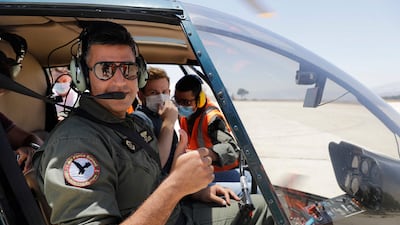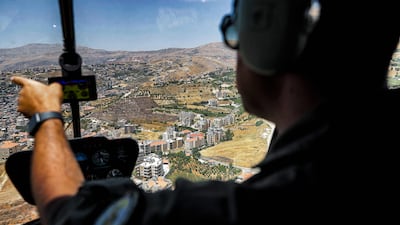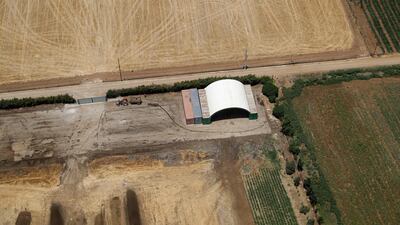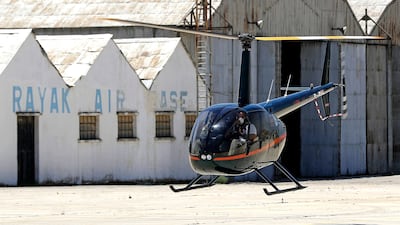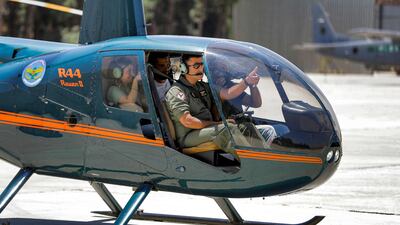In a blur of rotas, the nimble helicopter sweeps up off the asphalt, revealing the vast brown expanse of Lebanon’s Bekaa Valley rolling out in all directions.
Cars down below quickly become antlike in size. As the altitude increases, swimming pools shimmering in the summer heat begin to resemble the small blue tiles of a mosaic.
The helicopter swings out over the town of Zahle, offering a view of the Our Lady of Bekaa shrine that few have seen.
Lebanon is fighting an “economic war”, says Brig Gen Ziad Haikal, commander of the country’s air force. And that war, he says, requires “unconventional solutions”.
From this week, his fleet of Robinson R44 four-seat light helicopters will take on a new role — ferrying tourists into the sky for aerial trips of the cedar state in a desperate bid to raise money for a cash-strapped Lebanese army.
The country is convulsing in the worst economic crisis in its history, with salaries collapsing and poverty on the increase and the Lebanese armed forces are far from immune.
They have become desperately reliant on donations from other countries just to feed their soldiers and salaries have shrunk to a fraction of what recruits would have signed up for a year ago. A private soldier now earns the equivalent of just $90 — down from almost $850 before the crisis — and the officers not much more.
Two weeks ago, army chief General Joseph Aoun warned that without urgent support, the collapse of all state institutions — including the army — was inevitable.
“We do battles as a military. Usually, in military battles, we use our aircraft and firepower but this is an unconventional war so you have to face it with unconventional means,” Gen Haikal told The National at the launch of the project at the Rayak Air Base, which has previously housed units from both the French air force and Britain's RAF.
“You are not looking at an army that is just laying down and asking for help. They are trying to stay on top of the water and not to drown,” he said.
A flight costs $150 and can take up to three people on a fifteen-minute ride of the country’s sites. It is, Gen Haikal says, far cheaper than Las Vegas or Dubai, where similar experiences exist.
He has allocated resources for up to 1,000 hours of tourist flights per year. Despite announcing the offer only on Tuesday Gen Haikal says Thursday will see the first of more than 100 trips already booked. That should amount to almost $15,000 in fresh dollars before costs — a sum that will go a long way in helping weather the crisis.
The R44 helicopter costs around $300 an hour to keep in the air, so every minute a tourist flight is airborne is a valuable source of extra dollars for the air force — selling out all the seats on all 1,000 hours of flight time could net the military more than $2 million in the increasingly scarce US currency.
Gen Haikal is keen to show that the air force is being proactive about dealing with the crisis.
“We are not seeking help and doing nothing. We are trying to survive, to do something with whatever capability we have,” he said.
The scheme will soon include flights from four locations up and down Lebanon’s Mediterranean coast, from Batroun to Beiteddine.
Yet with the military, often seen as one of the few independent institutions and a source of stability in the country, going cap in hand for international support, morale is a major concern.
“So far we are doing good, the intention is to keep this morale high by showing everybody we are not standing still,” says the general.
“These initiatives are essential to keep the morale up and this is one step towards this.”
The flight is over in no time, leaving passengers wanting more.
This is Lebanon’s newest tourist attraction, but for the officer behind it, the stakes are far higher than a positive review on TripAdvisor.
“You cannot blame anybody for trying to survive, and we are in a battle of survival — believe me”.

